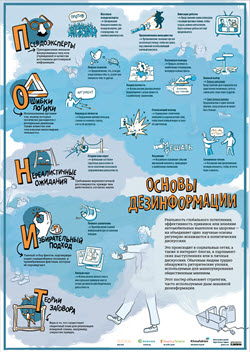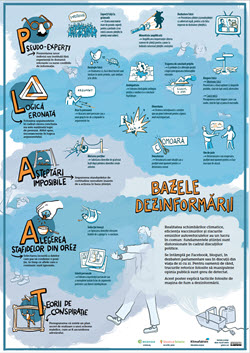PONIT and PLAAT: The FLICC poster now also available in Russian and Romanian
Posted on 11 October 2024 by BaerbelW
It is one of the most successful products of our German-language partner website klimafakten.de: a large-format infographic about typical disinformation strategies, not just in terms of climate. The poster has previously been available in eight languages, and now two more have been added. The new translations were produced with partners from Moldova and Russia.
If you are a regular user of our website, the abbreviation "FLICC" will certainly ring a bell. But you may also have seen it in connection with Covid-19 or the Cranky Uncle game or elsewhere on the Internet. In any case, the five letters stand for the five most common tricks used by disinformation campaigns: fake experts, logical fallacies, impossible expectations, cherry picking and conspiracy theories. Four and a half years ago, in April 2020, the collaboration between our team and klimafakten.de resulted in the initial publication of the poster in German ("PLURV") and English ("FLICC"). in addition to the digital online version, it's also available in A2 format on paper.
Over the years we have translated the graphic into six other languages: Dutch and Portuguese, Spanish and French, Luxembourgish and Polish. Now two more languages have been added: Russian and Romanian. And as with the previous versions, we have once again learned something about the respective target language. "Fake experts" are called "Psevdoyeksperty" in Russian and "Pseudi-Experti" in Romanian. "Logical fallacies" are called "Oshibki logiki" in Russia and "Logica Ernonatá" in Romania.
Many of the small images that Hamburg graphic designer Marie-Pascale Gafinen used to illustrate the strategies of disinformation in the poster have also been modified in the various languages over the years: Now in the Russian poster, for example, the sloth hanging on the branch at the bottom left of the graphic snores with the letters "X-P-P-P". Doesn't sound very sleepy? Sure, it does, because in the Cyrillic alphabet the characters stand for the sounds "CH" and "R".
Apart from such details, however, we didn't have to change anything in the content of the posters this time either. Because the way disinformation campaigns work is (unfortunately) universal. They are used in German and English, in Spanish and Russian, in Dutch and Romanian - and it doesn't matter whether someone is distorting the findings of climate science, manipulating information about the Covid-19 pandemic or trying to construct justifications for the war of aggression against Ukraine. The most tinkering is required in each case to find a catchy acronym that is easy to pronounce in the respective national language. In Russian it is now "PONIT", in Romanian "PLAAT".
Cooperation with Moldovan and Russian partners
Once again, a number of teams have been working with klimafakten on the topic: the two new translations were created together with the environmental organization Ecovisio from Chisinau in Moldova. The DOXA team also worked on the Russian poster; founded in 2017 as a student magazine in Moscow, it has since become a very popular news portal for Russian-speaking (young) people. Bärbel Winkler from our translation team once again supported the production of this poster.
With the Romanian (here free as a PDF) and the Russian version (here free as a PDF), our information poster is now available in ten languages and more are in preparation. The overview page with all editions can be found here.
Note to other translators:
If you'd like to translate The FLICC Poster into another language or help with a translation currently in progress, please contact us by selecting "Enquiry about translations" from the contact form's dropdown menu. In addition to translating the poster, we are also looking for help spreading the translated posters in countries where the languages are spoken. If you have any suggestions for that, please also let us know via the contact form. Thanks!
The creation of additional translations of the poster requires funding for professional design and layout work. You can contribute to that effort here.































 Arguments
Arguments

































Comments